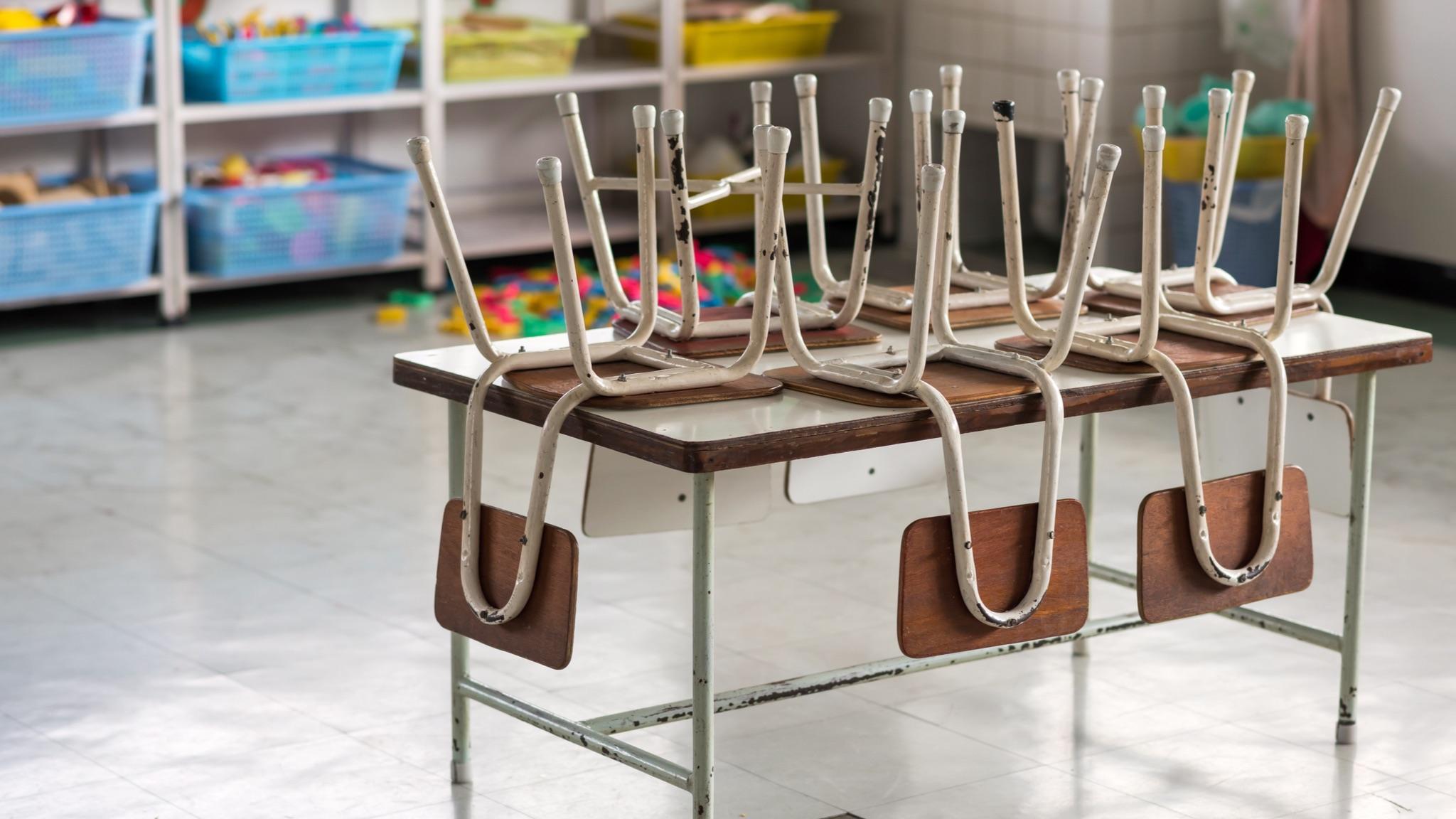A-levels: Over a third of NI results lower than estimated grades
- Published
- comments
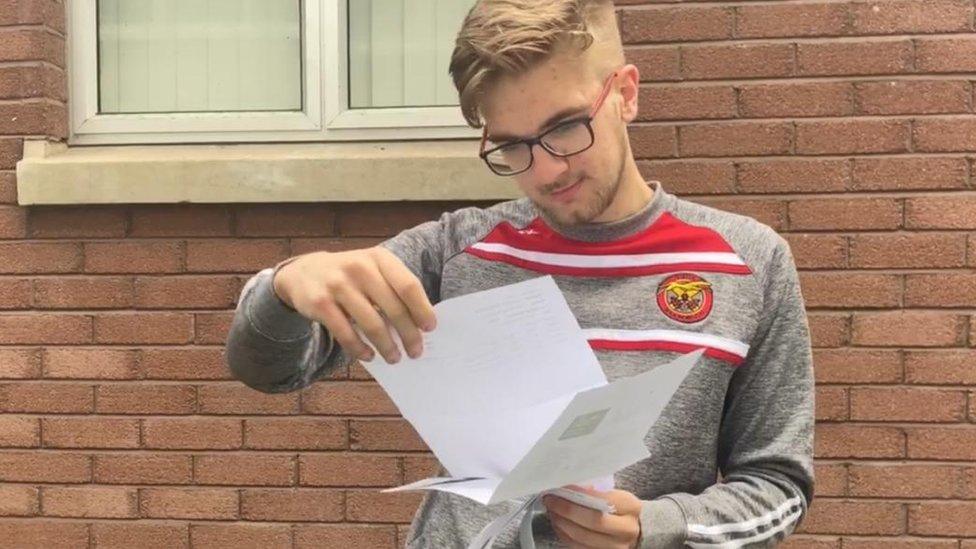
This year's results were estimated after exams were cancelled by the Covid-19 pandemic
More than a third of estimated grades allocated by teachers to Northern Ireland's A-level and AS level students were lowered in the final results.
About 28,000 pupils across Northern Ireland received their results on Thursday morning.
While the proportion of A* to A A-level grades rose by 2.3%, 37% of estimated grades were lowered; 5.3% were raised.
This year's results were estimated after exams were cancelled due to the Covid-19 pandemic.
Last year, 45.8% of estimated grades provided by schools matched the student's final results.
This year, 58% of A-level and AS results matched the estimated grades.
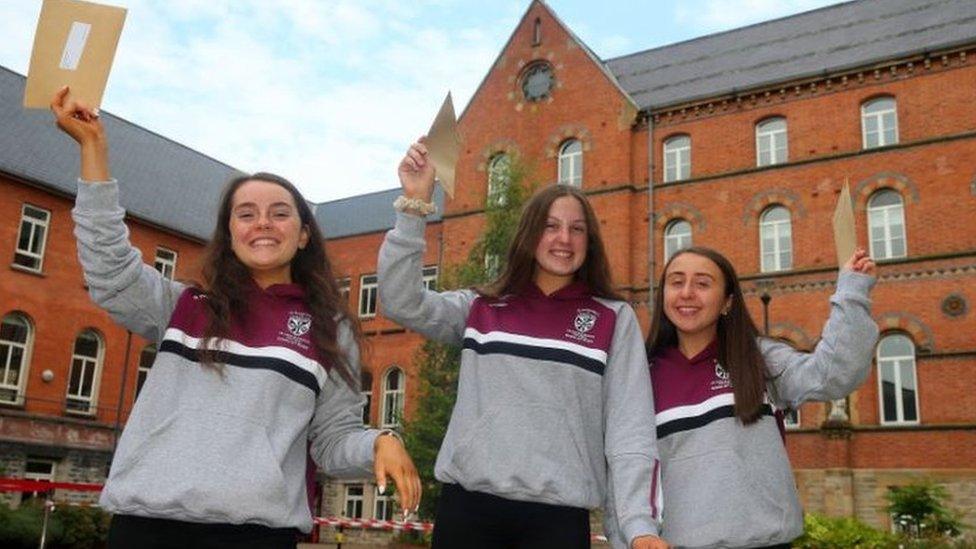
Pupils from St Dominic's Grammar School for Girls received their exam results on Thursday
After the exams were cancelled, examination body CCEA asked teachers to give a predicted grade for their pupils and then rank them in order within their class.
It then used other data to standardise the results. For A-levels, the model used pupils' AS-level results and resit data.
A similar system was used in England, where 36% of entries had a lower grade than teachers predicted.
In Northern Ireland, the proportion of A* grades increased by 1%.
A* to A grades rose by 2.3%. The overall percentage pass rate rose by 0.8%.
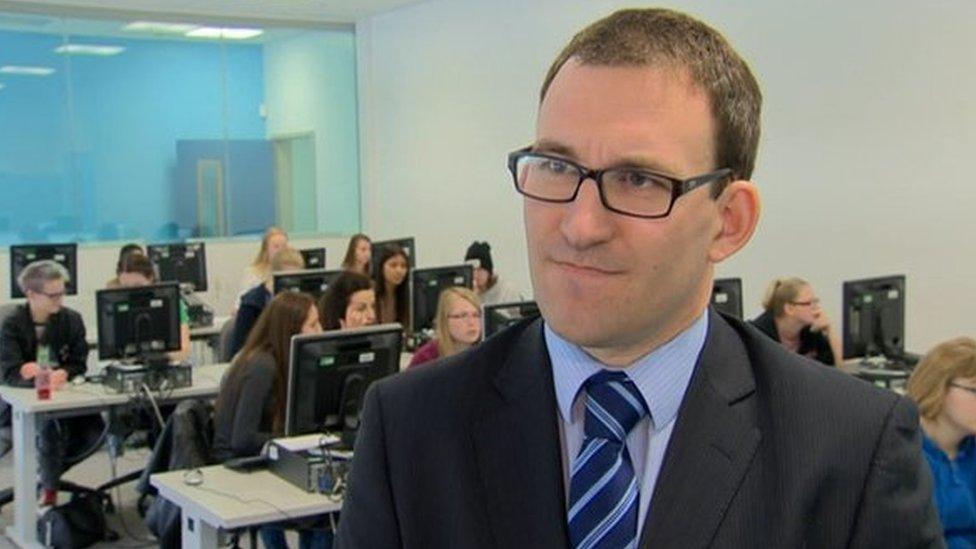
CCEA chief executive Justin Edwards says teachers can be "over confident" when predicting grades
The chief executive of examination body CCEA said if teacher judgement had been used on its own, results would have risen "considerably".
Justin Edwards said often teachers "over-predict" or are "over confident" when it comes to predicting the lower C-E grades in particular.
But he added he was "eternally grateful for the education workforce of Northern Ireland".
Mr Edwards said CCEA was the only awarding body in the UK who historically asked for predicted grades prior to issuing results.
"The main reason we ask for this is if something terrible happens to a child and we have to issue results and we want to know how to predict results for that child we can return to that data for that child," he said.
"In 2019, the predictions that were given to us were 45.8% accurate against the actual exam results that the children achieved, that is for both grammar and secondary schools."
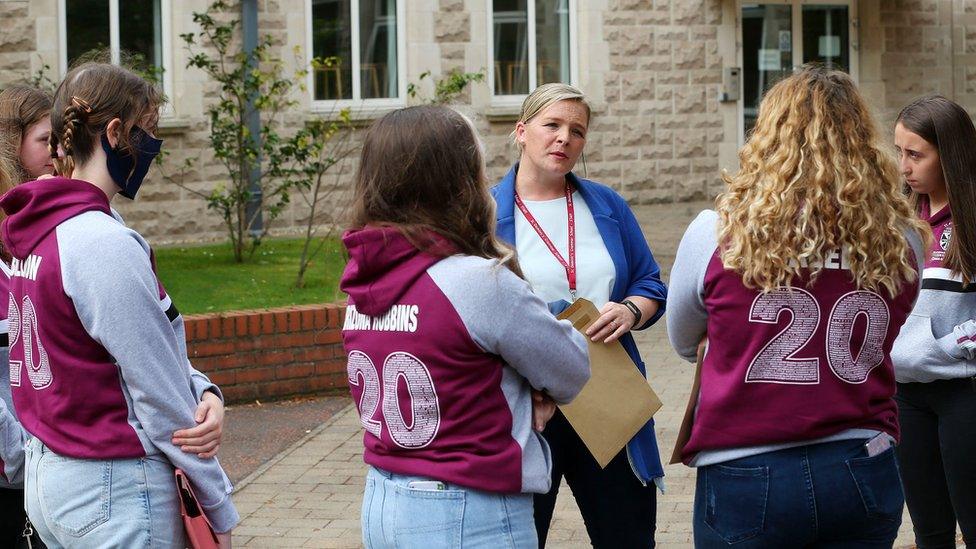
Some head teachers have reported pupils getting grades several levels below their estimated result
However, some head teachers have said their school's A-level grades have dropped significantly from the grades predicted by teachers.
Alan Hutchinson, from Glastry College, said 56% of their grades had been reduced.
"There are huge anomalies," he said.
"One pupil who achieved and was predicted an A at AS level has been taken down to a B - another pupil hadn't achieved an A but has been awarded an A.
"The important thing in this is not data, it's children and their futures.
"We have had teachers dealing with children who have had their dreams and aspirations taken away from them by an algorithm."

Results controversy just the beginning
Analysis by BBC News NI education correspondent Robbie Meredith
We should remember first of all that grades, overall, went up this year, so many pupils are going to be happy.
CCEA can say that their model allowed grades to rise, though not in an outlandish way.
However, many school staff feel that their predictions were totally ignored.
About 40% to 50% of predictions were lowered in some cases and there is anger and bewilderment.
I was talking to one grammar school head teacher this morning who had a pupil who at AS level was predicted a C grade but got a U.
They said that pupil was devastated - in tears - and the head can't work out how that happened.
This morning's results are just the beginning, rather than the end of the story.

Education Minister Peter Weir has defended the way in which the grades were calculated. describing the system as robust.
He said he had "great sympathy" for pupils who did not get the A-level result they expected, but stressed that overall results had gone up.
"However, for those not happy with the outcome I would emphasise that the results are provisional, and there is an appeals process available."
First Minister Arlene Foster backed the education minister, saying he "needed to provide a robust system so that when people look back at the children who received their grades during Covid-19, that those grades were robust and resilient".
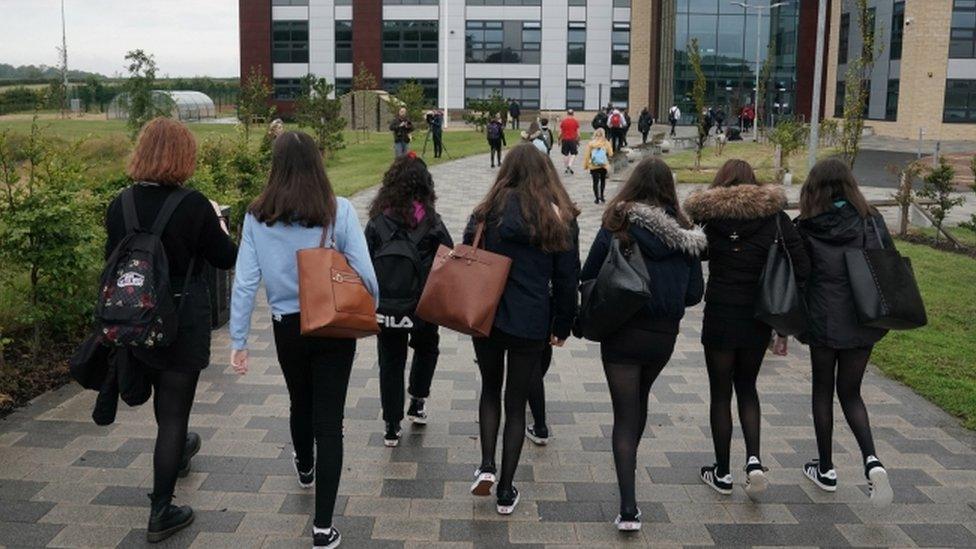
However Mr Weir faced criticism from some political parties.
Deputy First Minister Sinn Féin's Michelle O'Neill said it was a difficult day for many young people.
"The situation that many students find themselves in is unacceptable," she said.
"There needs to be an urgent resolution," she added.
SDLP education spokesman Daniel McCrossan said Mr Weir must "show leadership, scrap this flawed system and revert to predicted grades".
Chris Lyttle, from the Alliance Party, called on the education minister to "explain how the appeals process will address the low grades".
Ulster Unionist Party education spokesman Robbie Butler said the "methodology used has devalued A-levels in a lot of cases" and urged Mr Weir to "move urgently to provide a solution and end the uncertainty and suffering".
The minister and CCEA will be appearing before Stormont's Education Committee on Friday.

Is there a fair way to award grades without exams?

Even exams can be unfair. Sometimes two people marking the same paper will give different grades.
But this year's assessment and today's downgrades have left many people feeling their future chances have been harmed by an algorithm.
The standardisation system that led to the downgrades is there to stop grade inflation.
Without it, there would have been a 12% increase in people getting an A* or A grade, according to the head of Northern Ireland's main examination body - CCEA.
But if a school has a stronger year group than last year, or if teaching has improved, that might not be fully recognised this year.
And the information available to calculate grades differs across the UK: like in Wales, AS results contribute to overall A-level results in Northern Ireland and therefore can be taken into account.
However, this doesn't happen in England - where AS grades have no bearing on A-level results.
Research suggests that using AS performance can improve the overall accuracy of grades.
Grades could be calculated using a range of evidence including work to date, mock exams and teacher assessed grades, but even experts can't agree on a perfect way to navigate yet another difficult problem caused by the coronavirus.

In an email to principals on Wednesday, CCEA had admitted there would be "anomalies" in some of the grades awarded.
It said it would "start contacting schools where we have seen anomalies in terms of judgements provided and the grade issued".
In Scotland, results predicted by teachers alone will now be used to give pupils their grades.
That is after a major U-turn by the Scottish government on Tuesday, which abandoned a moderation system for grades by the Scottish Qualifications Authority.
CCEA is operating a dedicated exams helpline for pupils on 028 9026 1260 from 13-26 August.
- Published17 August 2020
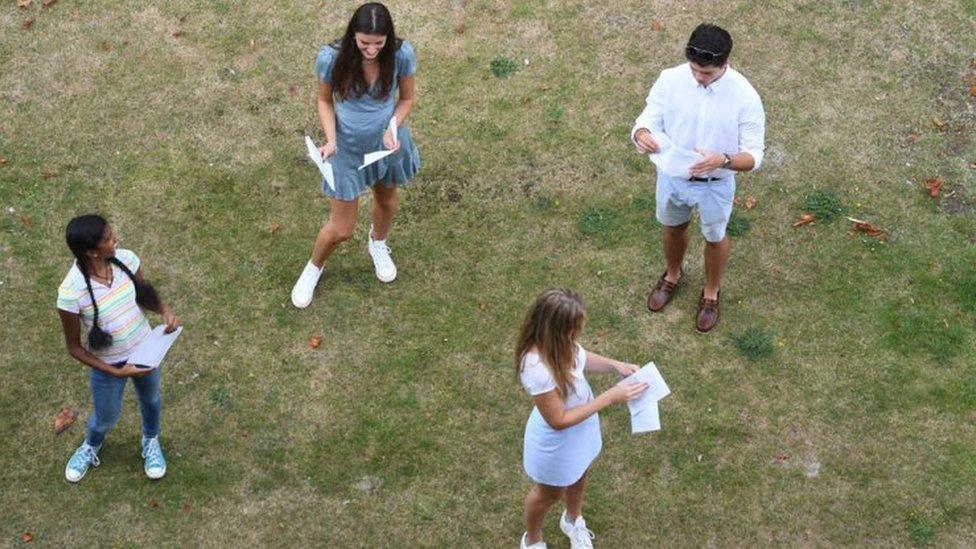
- Published13 August 2020

- Published12 August 2020
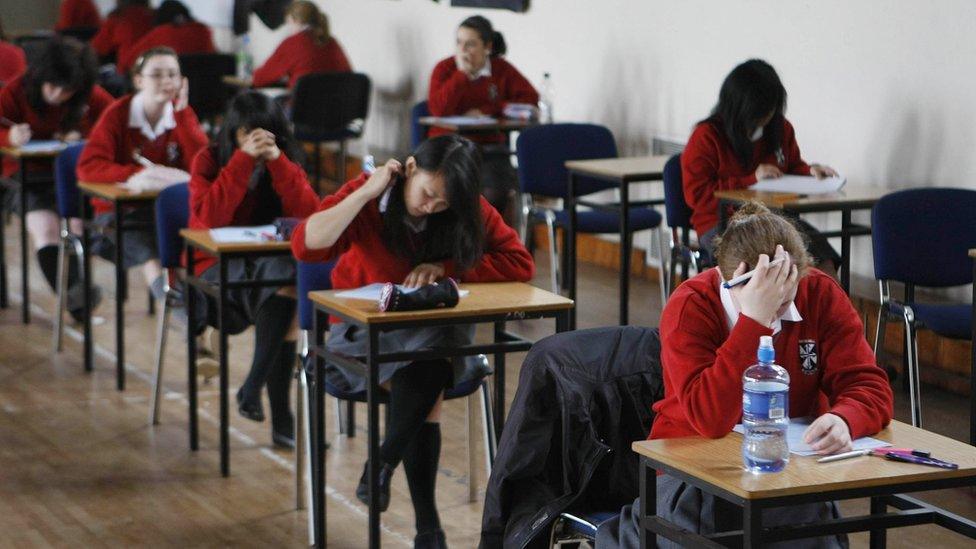
- Published16 April 2020
